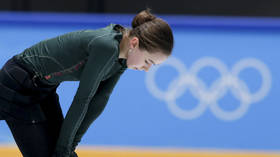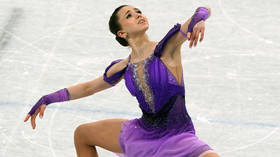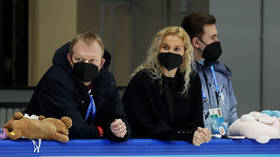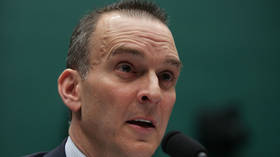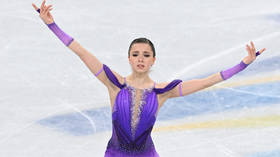Figure skating icon praises ‘absolute victim’ Valieva (VIDEO)
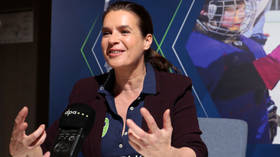
Kamila Valieva is the "absolute victim" of a drug-testing scandal which has engulfed the 15-year-old during the Beijing Games, two-time Olympic champion Katarina Witt has said while calling the intense media glare on the prodigy "not fair".
Figure skating sensation Valieva has been the source of international headlines ever since reports emerged that the Russian Olympic Comittee (ROC) star had failed a drug test for heart medication trimetazidine, which is on the World Anti-Doping Agency's (WADA) banned list, at the Russian championships in December 2021.
The Court of Arbitration for Sport (CAS) subsequently upheld a decision by the Russian Anti-Doping Agency (RUSADA) to lift a provisional suspension which Valieva had appealed against, explaining that her status as a minor and the "untimely" delay of more than six weeks between the test and the results being announced had informed its ruling.
The Russian and European champion's team contend that the positive test was the result of an accidental contamination with medication taken by Valieva's grandfather, and the full case looks unlikely to be resolved until long after the Winter Olympics.
Ahead of Thursday's free skate in which short program winner Valieva is the favorite, Witt says that the level of scrutiny being placed on someone so young is unfortunate.
"I did not want to be in her shoes and have that pressure and to go out there and skate as bravely as she did," 1984 and 1988 champion Witt told RT of Valieva's triumphant return to the ice on Tuesday.
"She made a little mistake but still she had to go out there: the entire world was watching, everyone had an eye on her, and of course the rest of the competition.
"It was so tough. The pressure that lies on that young 15-year-old girl, a minor – it’s not fair that she had to deal with such pressure.
"And for this, she was delightful, she was beautiful. Skating-wise, she is in her own league. It was a tough night for her but she really delivered."
Witt also notes that Valieva is facing intense pressure on two fronts: the expectations placed upon her performances and the doping allegations which have shrouded them.
WADA, the International Olympic Committee (IOC) and the International Skating Union (ISU) all asked CAS to deny Valieva the right to continue at the Games, and many of her critics believe that she should not be competing.
The IOC has also announced that there will be no medal ceremony if Valieva achieves a podium place, following on from the cancelation of the ceremony to award honors for the team event, in which the figure skater won gold with her ROC teammates a day before her test result was revealed.
"With what happened [over] the entire last week, it’s difficult for an athlete," said Witt.
"Even though you have your tunnel, you try not to concentrate on the outside – but she knows what pressure was on her and [it was] the same with the pressure on all the other competitors.
"She did a very good job going through this competition, dealing with what she’s dealing with, and what she definitely should not have to deal with."
Witt watched Valieva win the title at the European championships in Tallinn in January, when she passed a negative test for any performance-enhancing substances.
"I was so full of joy [at] her presence and her grace. Finding out a week ago, it changed the way you look at her, and that’s the sad part of the entire story.
"Once again, for me she is an absolute victim: she’s 15 years old, she’s a minor and she should not have to deal with what she has to face right now."
Witt, 56, also suggests that one way to avoid similar situations is to restrict the Olympics to over-18s, which she says would eliminate minors from having to compete under such intense pressure.
"I’m trying to throw in as an idea, to be a little bit provocative, that the Olympics should be open for 18-year-olds," she said.
"That’s why I’ve been asking, ‘Why do female skaters have to peak?’. There’s pressure to peak in their career while they’re 15 and don’t get the time to say, ‘I’m 15 [but] when I’m 19, I’m still there – there’s still enough to give.’"
Witt first broke out in her sport during the late 1970s but only claimed her first European gold medal during the 1983–84 season – and she says that those extra years afforded her more of a chance to mature and deal with the lofty expectations placed upon her by the former East Germany.
"At least I was 18 at my first Olympics – and still, yes, there was big political pressure too, because the Cold War was going on and, of course, my country wanted me to win, and I did myself," she explained.
"At least we didn’t have Instagram and Facebook, let’s put it this way. I think this made a big change, that in some ways you felt a bit more protected and not scattered in every direction.
"Now everything is so quick in the attention of the entire world, so much more quick than it was 30 or 40 years ago. So I think it’s definitely different."
Witt says there should be little leniency towards doping in sport.
"First of all, for all the honest and clean athletes it’s zero tolerance for doping in any sport and in any direction," Witt said.
"If you take skating, there haven’t been really discovered cases international-wise. In the end, the doping doesn’t help you to turn four times or to have that grace or that beauty. Of course, it probably helps [if] instead of doing 50 jumps you are able to do 100 jumps, so you have the repetition.
"But honestly, I never was thinking it helps you. I grew up with this value to be honest and to be truthful and it should be all your own work, so everyone has the same chances. If there is doping anywhere, there should be bans for the rest of their lives – honestly."
When it comes down to it – and regardless of the unfair expectations and pressure she says have been placed on Valieva – Witt says the episode has been harmful to figure skating.
"In this entire game, everyone has lost," Witt suggested.
"For this alone, it’s no fair decision by holding back [medals] because we don’t know exactly what the outcome will be.
"In general, it’s a disaster for sports I must say – and especially for all the athletes who are involved in it."
